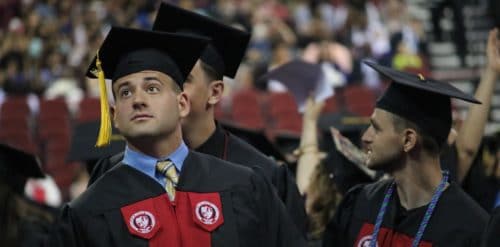Montclair State University has done away with school-based convocations and will now be holding three separate commencement ceremonies according to graduation term —prompting strong reactions from students.
When news of the scheduling change was announced to students via email, some students were not pleased with the change, fearing that the length of the ceremony would be too time-consuming.
“[Montclair State] shouldn’t take away from the experience just because they want to save money by combining all the ceremonies,” said Emily Meszaros, a senior general humanities and sociology major.
Alessia Pace, a junior psychology major, wondered aloud if it caused a safety issue. “First of all, it’s dangerous to have that many people crammed in a building, not to mention the traffic it’s going to cause if commencement is held in Newark like it was last year. [The university] is only thinking about the cost.”
The new arrangement offers students a ceremony on Jan. 23, with a mixture of undergraduates and graduates. In the spring, undergraduates and graduates will have two separate ceremonies that are only days apart—on May 22 for graduate students and May 25 for undergraduates.
In each ceremony, all of the students’ names will be called to receive their diploma on stage while family and friends watch from the audience. The ceremonies will be held indoors, and all students and their families will only have to go to one event.
“I don’t think there is anything to be displeased about,” said Karen Pennington, vice president for Student Development and Campus Life. “They will still have their name called, walk across the stage, shake hands with the president, provost and/or dean and not have to limit what family or friends can watch [them graduate]. They also don’t have to worry about melting in the heat or getting rained on. They won’t have to be anxious about whether or not the event will be cancelled. If you graduate much before May, you won’t have to wait forever to have a chance to celebrate your success.”
Pennington explained why the university decided to eliminate convocation ceremonies, saying it was made “after facing years of unpredictable weather, which caused disfiguration of past convocations due to downpours and unbearable heat.”
She said the administration wanted to provide students with what they wanted. By using annual surveys and suggestions from previous graduating classes, the decision on the matter became clear, Pennington said.
According to Pennington, the content of the ceremonies will fit the needs of the individuals who are graduating in the moment, and there will not be a separate convocation. As well, she mentioned that the ceremony will be longer, however students will have the option of choosing one that is most convenient for them.
Some students said they felt the new arrangement was more convenient for them, knowing that they only had to go to the ceremony that they desired to go to.
Sasha, a senior who preferred her last name not be printed, said, “I don’t think it’s a bad idea. Waiting might be the only bad part.”
The length of the ceremony seems to be the key problem, according to student reactions, as they must wait for everyone to be called up on stage to receive their diploma.
Pennington said, “The ceremony will be longer, but will be adjusted so that it will not be a marathon-long event.”
Antoinette, a senior who preferred her last name not be printed, expressed her thoughts on waiting and said, “If you can wait a whole four years, you can wait a couple of more hours for your diploma.”



